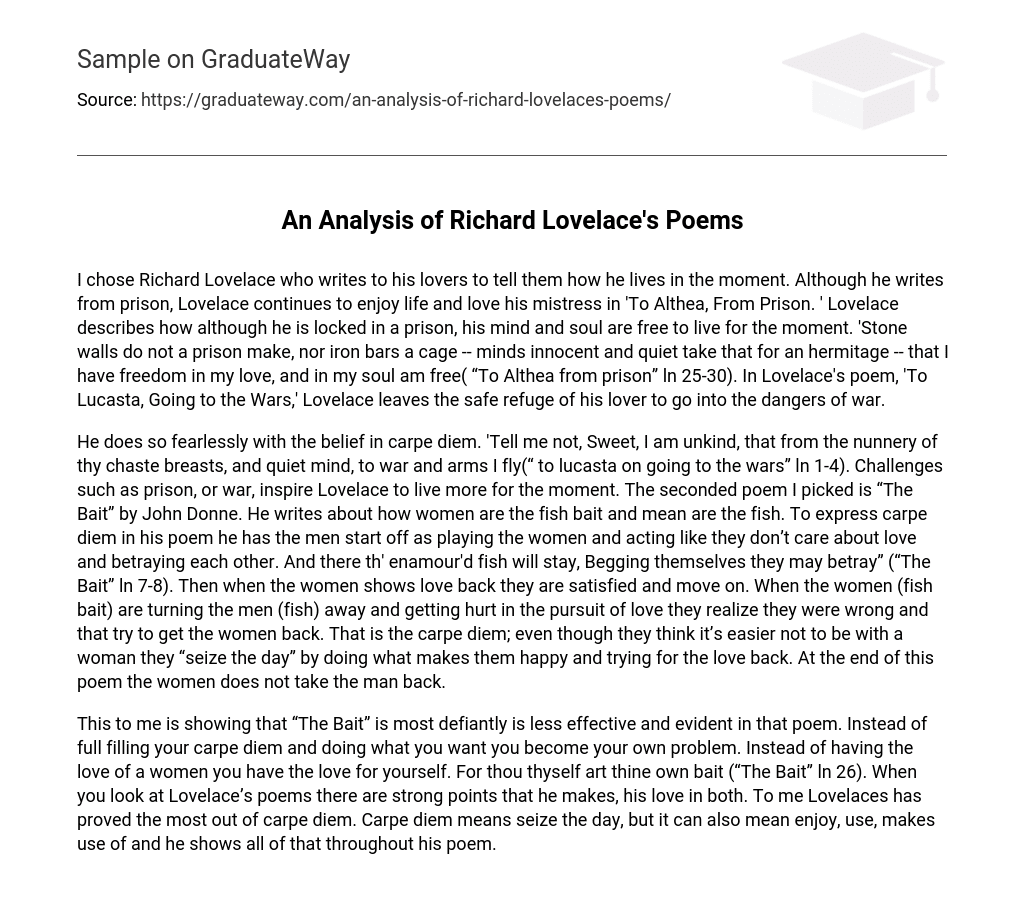Richard Lovelace’s poetry focuses on living in the present moment, even from within the confines of prison. In his poem “To Althea, From Prison,” he expresses his ability to continue enjoying life and loving his mistress. Despite being physically locked up, Lovelace believes that his mind and soul are liberated. He proclaims, “Stone walls do not a prison make, nor iron bars a cage — minds innocent and quiet take that for an hermitage — that I have freedom in my love, and in my soul am free” (lines 25-30). Furthermore, in another poem titled “To Lucasta, Going to the Wars,” Lovelace abandons the safety of his lover to face the perils of war.
He fearlessly embraces carpe diem, expressing it through his poetry. The first poem I chose is “To Lucasta on Going to the Wars” by Richard Lovelace. Lovelace speaks of leaving the safety of his lover’s presence and embracing the challenges of war, passionately declaring, “Tell me not, Sweet, I am unkind, that from the nunnery of thy chaste breasts, and quiet mind, to war and arms I fly” (ln 1-4). Facing obstacles like imprisonment or warfare serves as inspiration for Lovelace to live in the present moment.
The second poem I selected is “The Bait” by John Donne. Donne likens women to bait and men to fish. To convey the concept of carpe diem in his poem, Donne depicts men initially pretending not to care about love and betraying one another, playing the role of women. “And there th’ enamour’d fish will stay, Begging themselves they may betray” (ln 7-8). However, when women reciprocate their love, the men are satisfied and move on.
When women (acting as bait) reject men (the fish) and experience heartache in their pursuit of love, they realize their mistake and attempt to win the women back. This signifies carpe diem; despite initially believing it would be easier to avoid relationships with women, they seize the day by pursuing what brings them joy and striving to regain the love they once had. Ultimately, in this poem, the woman refuses to take back the man.
The text suggests that “The Bait” is clearly less effective and observable in comparison to other poems. Instead of following the carpe diem philosophy and pursuing one’s desires, the poem highlights the individual becoming their own obstacle. In place of experiencing love from a woman, the focus shifts to self-love. As stated, “For thou thyself art thine own bait” (“The Bait” ln 26). Upon examining Lovelace’s poems, he effectively conveys strong viewpoints on love in both instances. To me, Lovelace has demonstrated the essence of carpe diem the most. Carpe diem refers to seizing the day, but it also encompasses enjoyment and utilization, all of which he portrays throughout his poem.





